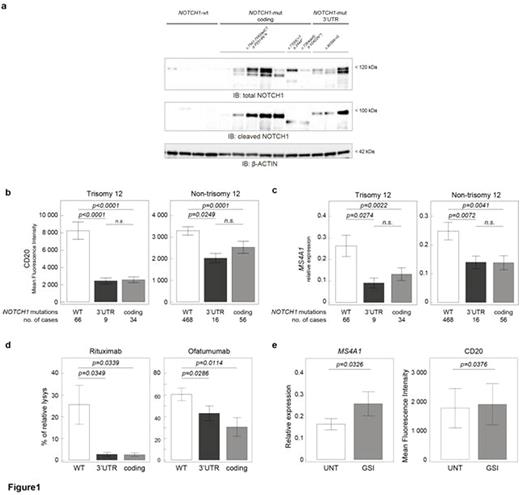Abstract
Background. In chronic lymphocytic leukemia (CLL), NOTCH1 mutations associate with clinical resistance to anti-CD20 immunotherapy in FCR combination (Stilgenbauer et al., Blood, 2014, Dal Bo et al., AHO, 2014), that can be ascribed to a NOTCH1 mutation-driven repression of CD20 levels by HDACs (Pozzo et al., Leukemia, 2016). Recently, novel recurrent mutations have been identified in the 3'untranslated region of NOTCH1 (3'UTR NOTCH1 mutations), determining a novel splicing event within the last NOTCH1 exon (Puente et al., Nature, 2015), leading to an impaired degradation of NOTCH1 protein.
Aim. To determine if 3'UTR NOTCH1 mutations associate with low CD20 levels.
Methods.NOTCH1 mutations were screened by next-generation sequencing (NGS) in exon 34 and part of 3'UTR with at least 1000X coverage. NOTCH1 (transmembrane, TM, or intracytoplasmic domain, NICD) protein levels were investigated by western blot (WB). CD20 expression was investigated by flow cytometry with a FITC-conjugated anti-CD20 antibody (L27 clone). MS4A1 (encoding for CD20 protein) transcript levels were investigated by qRT-PCR. Susceptibility to anti-CD20 rituximab and ofatumumab was investigated by complement-dependent cytotoxicity (CDC) assay. NOTCH1 signaling was inhibited by gamma-secretase inhibitor (GSI).
Results. i) NOTCH1 mutational screening. In 649 CLL, NOTCH1 mutations were detected in 115 cases (17.72%), overall accounting for 127 mutations (73 c.7541-7542delCT, 11 other frameshift, 17 nonsense, 1 missense, and 25 3'UTR mutations). For analysis purposes, the 115 mutated cases were subdivided in cases with NOTCH1 coding mutations (coding NOTCH1-mut, 90 cases) and cases with 3'UTR NOTCH1 mutations (3'UTR NOTCH1-mut, 25 cases). Four cases with concomitant 3'UTR NOTCH1 mutation and coding NOTCH1 mutation were assigned to the 3'UTR group according to the substantially higher mutational burden detected for the 3'UTR mutation. ii)NOTCH1protein expression. In keeping with alternative splicing events causing an impaired NOTCH1 protein degradation, 3'UTR NOTCH1-mut cases showed higher levels than NOTCH1 wild-type (NOTCH1-wt) cases of both NOTCH1 TM and NICD by WB, and similar to coding NOTCH1-mut cases (Fig. 1a). iii) CD20 expression levels. According to FISH classification, variable CD20 levels were found by flow cytometry, with the highest levels in trisomy 12 CLL. Of note, 3'UTR NOTCH1-mut cases expressed lower CD20 levels than NOTCH1-wt cases in both trisomy 12 CLL (mean MFI in 9 3'UTR NOTCH1-mut cases = 2446.11 vs mean MFI in 66 NOTCH1-wt cases = 8254.20; p<0.0001) and non-trisomy 12 CLL (mean MFI in 16 3'UTR NOTCH1-mut cases = 2033.50 vs. mean MFI in 468 NOTCH1-wt cases = 3294.07; p=0.0001), and comparable to coding NOTCH1-mut cases (trisomy 12 CLL, mean MFI in 34 coding NOTCH1-mut cases = 2570.73; p=0.8530; non-trisomy 12 CLL, mean MFI in 56 coding NOTCH1-mut cases = 2538.13; p=0.1500) (Fig. 1b). Similarly, in both trisomy 12 CLL and non-trisomy 12 CLL categories, MS4A1 transcript levels were lower in 3'UTR NOTCH1-mut cases than in NOTCH1-wt cases (p=0.0274 and p=0.0072, respectively), again with expression levels comparable with coding NOTCH1-mut cases (p=0.2874 and p=0.9610, respectively, Fig. 1c). iv) Susceptibility to anti-CD20 in vitro. In keeping with CD20 levels, 3'UTR NOTCH1-mut cases showed lower relative lysis induced by rituximab or ofatumumab, in CDC assay, than NOTCH1-wt cells (7 3'UTR NOTCH1-mut cases, 9 NOTCH1-wt cases; mean relative lysis upon rituximab: 2.67% vs. 25.56%; p=0.0349; mean relative lysis upon ofatumumab: 39.26% vs. 60.64%; p=0.0286). In the same manner, coding NOTCH1-mut cases showed lower relative lysis induced by rituximab or ofatumumab than NOTCH1-wt cases (9 coding NOTCH1-mut cases, 9 NOTCH1-wt cases; mean relative lysis upon rituximab: 2.53% vs. 25.56%; p=0.0339; mean relative lysis upon ofatumumab: 30.60% vs. 60.64%; p=0.0114; Fig. 1d). v) Modulation of CD20 expression by NOTCH1 inhibition. GSI treatment increased both CD20 protein and transcript levels in 3'UTR NOTCH1-mut cases, as previously reported for coding NOTCH1-mut cases (p=0.0376 and p=0.0326, respectively; Fig. 1e,Pozzo et al., Leukemia, 2016).
Conclusions.In keeping with an impaired NOTCH1 protein degradation, 3'UTR NOTCH1-mut cases had low CD20 expression levels, suggesting the introduction of 3'UTR NOTCH1 mutation evaluation in CLL patients undergoing anti-CD20 immuno-chemotherapy.
No relevant conflicts of interest to declare.
Author notes
Asterisk with author names denotes non-ASH members.


This feature is available to Subscribers Only
Sign In or Create an Account Close Modal